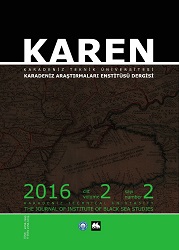Türkiye’de Orman Mülkiyeti, Yaşanan Sorunlar ve Çözüm Önerileri
Forest Ownership in Turkey; Problems and Solutions
Author(s): Hüseyin Ayaz, Cantürk GÜMÜŞSubject(s): Economy, Geography, Regional studies, Energy and Environmental Studies, Socio-Economic Research
Published by: Karadeniz Teknik Üniversitesi - Karadeniz Araştırmaları Enstitüsü
Keywords: Forest Ownership; Forests Nationalising; Forest Ownership Conflicts;
Summary/Abstract: Forests cover almost 30 percent of the land area in the World and are vital natural resources for the sustainability of life. Moreover, these natural resources are of economic value and thus subject to ownership and use by society and individuals. In this regard, there have been severe conflicts and discussions in countries where a sound legal foundation is lacking as to the ownership (who owns it) and the utilization of the resources (how it should be utilized). Turkey is one of the countries struggling with these problems. During the Ottoman Empire, since the mid 19. Century, Forest lands had also been opened to private ownership as part of the process of privatization of agricultural lands. However, within fifteen years after the establishment of the new republic in 1923, the acceptability of forest lands being a subject to private ownership and the legitimacy of the private forest ownership thus emerged were discussed and argued. As a result, a forestry law was passed in 1937, legally defining forest, ownership and forestry activities. With this law, expropriation of some private forest lands had been envisaged. However, a radical ammendment to this law was passed in 1945, redefining and nationalising all forests across the country with some exceptions. All laws that have been put into effect since the establishment of the Turkish Republic make no provision for private ownership of forested lands. Moreover, some constraining statements were included in the constitutions of 1961 and 1982, stating that public forests could under no cicumtance be a subject matter for privatization. Almost all forest areas (99,9%) are publicly owned (state forest). However, ownership disputes still continue. Forested areas previously owned by individuals or organizations have been recorded and registered as the state forest through land and forest cadastre and court decisions. Those who object the court decisions, after the exhaustion of domestic remedies, lodge an application with the European Court of Human Rights (ECHR) providing the court with the necessary land ownership certificates and other legal documents. The ECHR has in the past convicted Turkey due to the violation of right of property. Today, with the public introduction of Individual Application to the Turkish Constitutional Court, a way was opened for the compensation of the expropriated forest lands for which ownership certificates were declared null and void.
Journal: Karadeniz Araştırmaları Enstitüsü Dergisi
- Issue Year: 2/2016
- Issue No: 2
- Page Range: 212-236
- Page Count: 25
- Language: Turkish

